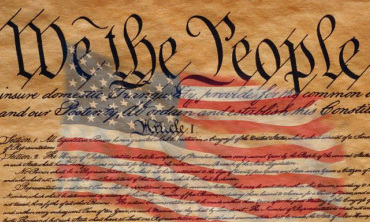
I just attended the Franklin College session celebrating Constitution Day that was sponsored by the Political Science department. The speaker was Professor Eric Dannemeier from the McKinney School of Law at IU in Indianapolis. The topic – Standing to Sue – seemed, well, obscure to me at first, but I quickly learned about four important cases in this area that affect environmental policy and practice today.
The heart of this issue as I heard it links back to the constitutional right that citizens have to petition the government. The courts do limit this right, though, to the people that have been directly affected by the transgression. In other words, I cannot sue someone because, for example, I observed that person hit someone else’s car. I can only sue if MY car was hit.
This relates directly to environmental law: under what circumstances can I sue a person or organization (or governmental body) about an environmental issue? A tree cannot sue for being cut down, or a mountain cannot sue for being stripped. It turns out that a lawsuit can only happen when someone has been directly affected, and not just when someone says it destroys a lovely view (an ethical value). In principle I may want that lovely view to exist, but that doesn’t give me standing in a court of law unless it has a direct impact.
Additionally, it turns out that a state, such as Indiana, also now has a right to sue on behalf of its citizens because they have a degree of “quasi-sovereignty” (and there is a word I have never used before). When the constitution was set up, the states did not give up all of their rights, and in this case they do retain the right to sue on behalf of their citizens.
The session closed with a short but incisive discussion on Indiana’s same sex marriage status in the courts. I, for one, did not know that of the 24 federal courts that have reviewed the status of same-sex marriage, 23 of those courts have ruled that the states have no right to prevent same-sex couples from marrying. It appears that same-sex marriages may not even need to be heard by the Supreme Court because the precedents are so clear. Loving v. Virginia and Lawrence v. Texas are the relevant decisions from the Supreme Court that are key to these decisions.
This turned out to be an engaging learning experience for me, and a valuable time for me to spend in celebration of Constitution Day. By the way, I also learned that colleges that receive Federal funds are required to have a program on the topic of Constitution. As noted in the program, there is not an easy way to enforce this, but I am glad that provision of a law, and the work of the Political Science department, enabled a good discussion today.
Last note: I am not a lawyer! If I did represent something incorrectly, please let me know in the comments.
The heart of this issue as I heard it links back to the constitutional right that citizens have to petition the government. The courts do limit this right, though, to the people that have been directly affected by the transgression. In other words, I cannot sue someone because, for example, I observed that person hit someone else’s car. I can only sue if MY car was hit.
This relates directly to environmental law: under what circumstances can I sue a person or organization (or governmental body) about an environmental issue? A tree cannot sue for being cut down, or a mountain cannot sue for being stripped. It turns out that a lawsuit can only happen when someone has been directly affected, and not just when someone says it destroys a lovely view (an ethical value). In principle I may want that lovely view to exist, but that doesn’t give me standing in a court of law unless it has a direct impact.
Additionally, it turns out that a state, such as Indiana, also now has a right to sue on behalf of its citizens because they have a degree of “quasi-sovereignty” (and there is a word I have never used before). When the constitution was set up, the states did not give up all of their rights, and in this case they do retain the right to sue on behalf of their citizens.
The session closed with a short but incisive discussion on Indiana’s same sex marriage status in the courts. I, for one, did not know that of the 24 federal courts that have reviewed the status of same-sex marriage, 23 of those courts have ruled that the states have no right to prevent same-sex couples from marrying. It appears that same-sex marriages may not even need to be heard by the Supreme Court because the precedents are so clear. Loving v. Virginia and Lawrence v. Texas are the relevant decisions from the Supreme Court that are key to these decisions.
This turned out to be an engaging learning experience for me, and a valuable time for me to spend in celebration of Constitution Day. By the way, I also learned that colleges that receive Federal funds are required to have a program on the topic of Constitution. As noted in the program, there is not an easy way to enforce this, but I am glad that provision of a law, and the work of the Political Science department, enabled a good discussion today.
Last note: I am not a lawyer! If I did represent something incorrectly, please let me know in the comments.

 RSS Feed
RSS Feed